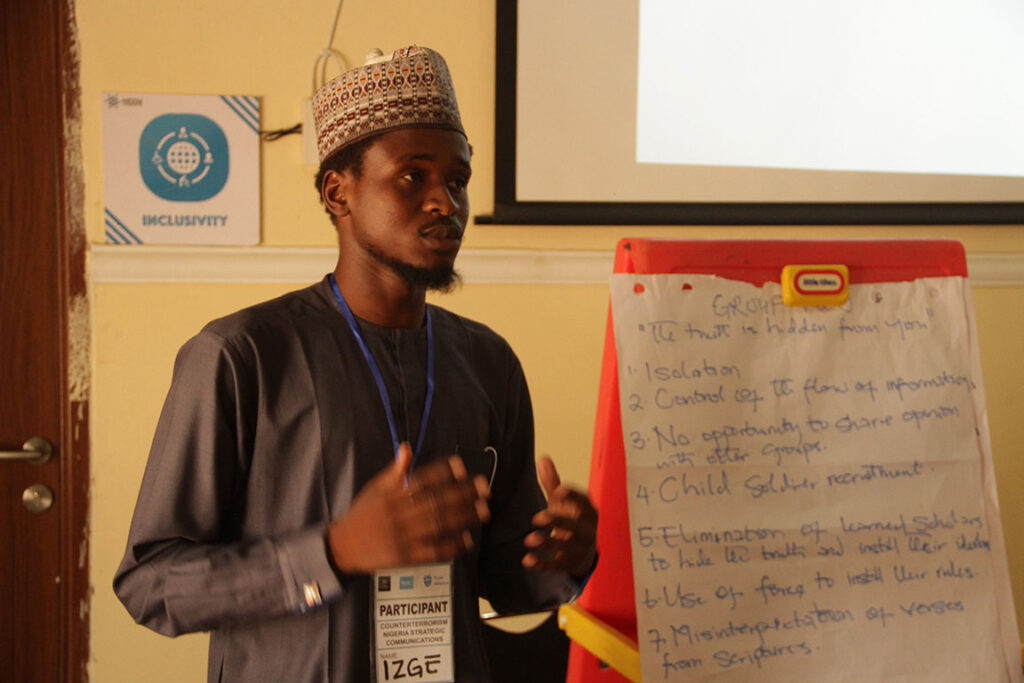ADF STAFF
In a region of Nigeria plagued by terror attacks, people have banded together to fight back with a powerful weapon: the truth.
Based in Maiduguri, the capital of Borno State, the Truth Alliance is a network of civil society organizations working to spread messages of hope and expose the truth of how violent extremist groups in the area lure young people into their ranks.
“We believe the time has come to tell the about the traps, the tricks, the lies and the deceit that are used to draw them in,” the group’s website declares. “We want people to think for themselves about this truth, to realize if it’s too good to be true, it usually is.”
Africa’s most populous country has struggled with a violent insurgency that launched in the North East region more than two decades ago. Today, Boko Haram and a splinter group that expanded to become the Islamic State West Africa Province (ISWAP) fight each other for supremacy and territorial control.
Nigerian security forces have diminished the groups’ capabilities in recent years and pushed them into forest strongholds, borderlands and the Lake Chad basin. But the groups are well funded and resilient.
Over the years, insurgent activities have stifled economic development and forced farmers to flee rural areas in Borno State. Recruiting disaffected youth in need of money is a common tactic of extremist groups.
Truth Alliance spokesperson Ahmad Mustapha recently was joined on the group’s radio show by Garba Yusuf, a counselor and researcher with the Abuja-based Neem Foundation, a crisis response organization. Yusuf said unemployment and poverty are key factors that Boko Haram and ISWAP exploit to recruit young people into their ranks. Terrorist recruiters use large sums of money as a tactic to deceive and manipulate young people.
“The key factor that lures the people into them [Boko Haram and ISWAP] is unemployment,” he said during the June 8 episode of the Truth Alliance’s radio talk show. “It is easier to influence a jobless person to join terrorism.”
Among the Truth Alliance’s other recent efforts was a series of theatrical dramas performed in June in several Borno communities, including Baga Road, Bolori, Bulumkutu, Gamboru, Hausari, and Showkari in Maiduguri. The play told the true story of a woman who was deceived into joining Boko Haram.
“Each person has their own story to tell of the way they were manipulated to join and how once in, their lives and those of their families were destroyed as a result,” Mustapha told the Daily Nigerian online newspaper. “Others tell the story of how they became innocent victims of Boko Haram’s destructive path.”
The alliance also made use of the internet with a series of animated YouTube videos and a three-part audio series, all of which share stories of civilians who have been affected by terrorism and of reformed insurgent fighters who have returned to society and want to warn others to avoid extremist recruiters.
Mustapha has found that personal stories from peers can have a powerful impact.
Talking directly to her target audience, a Borno State girl named Suwaiba Abdulrasheed filmed a video appeal that recently was disseminated on the Truth Alliance’s social media accounts, calling for young people to think about the religious information they receive from people in their lives and whether it has a positive effect on society.
“If you’re in a group or society and have something bothering you, don’t hesitate to seek help from a mental health advocate,” she said. “We should be careful and sensitive about the people we interact with. Are they adding value to our lives? What are their motives?”
Mustapha believes that revealing the truth about Boko Haram’s and ISWAP’s recruiting tactics gives his group a clear mission and call to action.
“Violent extremist groups always conveniently find ways to hide the truth about what they do,” he told the Niger Delta Herald newspaper. “They are always out to harm innocent people. They lie, they cheat, and they commit all sorts of crimes against every member of the society. They claim to represent Islam, but the truth is far from that.”

